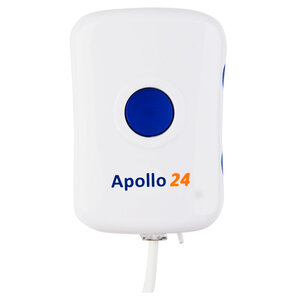
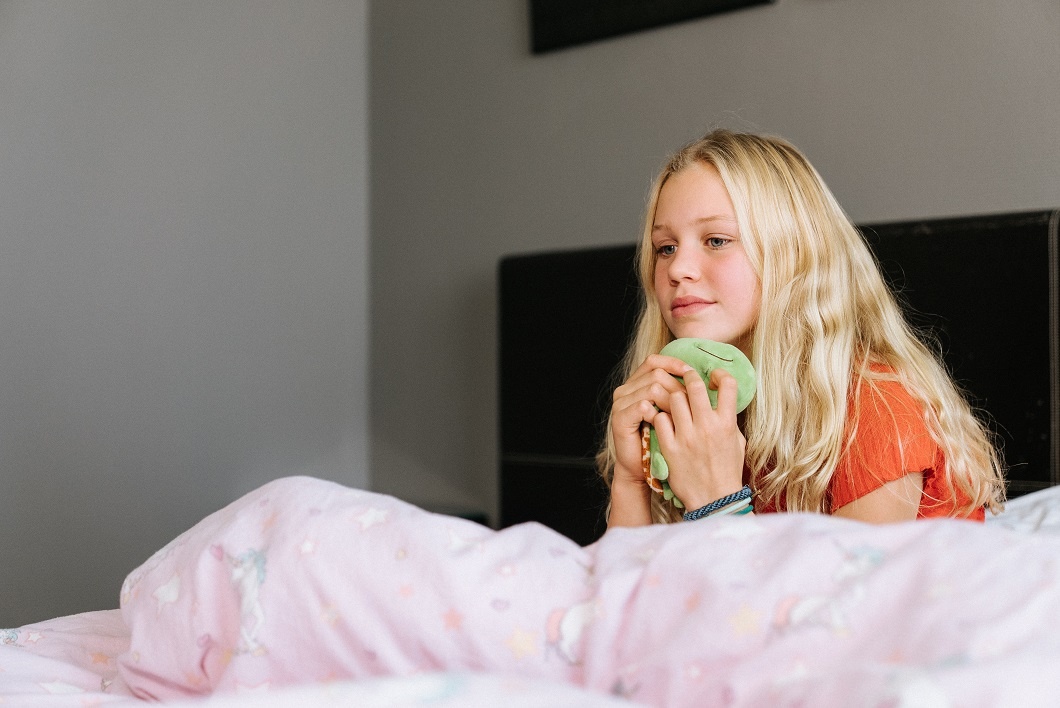

Learn to cycle, swim and stop wetting the bed
Children make big steps in their first years of life and toilet training is part of that. Most children are toilet trained during the day around the age of three. Potty training at night usually takes a little longer. Your child has to learn something while he or she is sleeping soundly.
This learning process of waking up to go to the bathroom differs per child. Compare learning to walk, learning to cycle or learning to swim. Every child learns this at his or her own pace and there is nothing strange about that.
On average, children manage to stay dry at night around their 4th birthday. Sometimes this takes a little longer. This is not a problem at all, but if it goes on for too long it can become annoying. Your child thinks he or she is the only one and cool things like sleepovers and (school) camps are preferably avoided. For some children this even leads to social problems and can also affect their school performance.
Bedwetting can also be annoying for you. Some parents feel disappointed that bedwetting continues for so long. Your own night's sleep can of course suffer, and then there is also the extra dirty laundry and the cost of diapers.
Fortunately, there are various options to tackle bedwetting. Before we discuss these, let us first consider the possible causes of bedwetting.

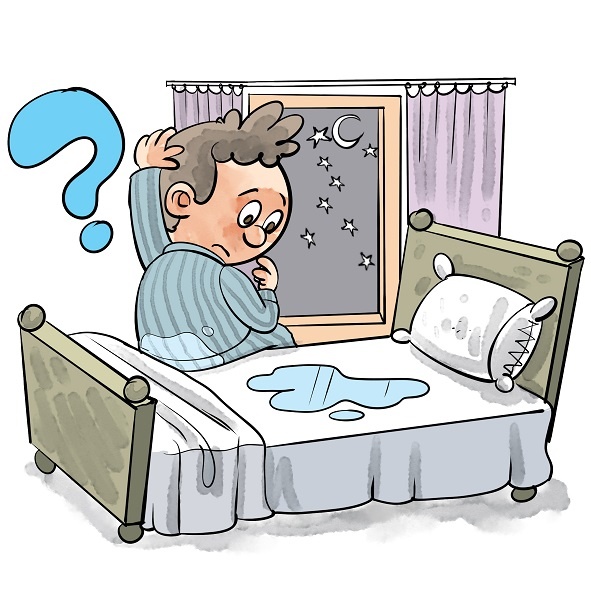

Bedwetting: what are the causes?
If your child still wets the bed before their 5th birthday, this is completely normal. Your child just takes a little more time than others on average to become potty trained at night. Other children will spend longer in the first pool during swimming lessons, for example. Every child develops at his or her own pace.
For children aged 5 years and older who wet the bed at least a few times a week, it can be experienced more often as a problem and from that moment on it is also referred to as bedwetting. What are the actual causes of bedwetting?
There are many possible causes. Fortunately, it rarely has a physical cause (such as abnormal bladder function) and is usually related to the fact that the brain does not convert the stimuli from a full bladder into a wake-up reflex. The brain does not inform your child in time to wake up. As a result your child unconsciously wets the bed.
Bedwetting may be hereditary if one or both parents have previously wet the bed for longer periods of time. Other causes such as psychological complaints are much less common. Would you like to know more about all possible causes? Then click here and read all the causes of primary and secondary bedwetting.
Did you know that bedwetting occurs twice as often in boys as in girls? A real cause for this has never been scientifically found.

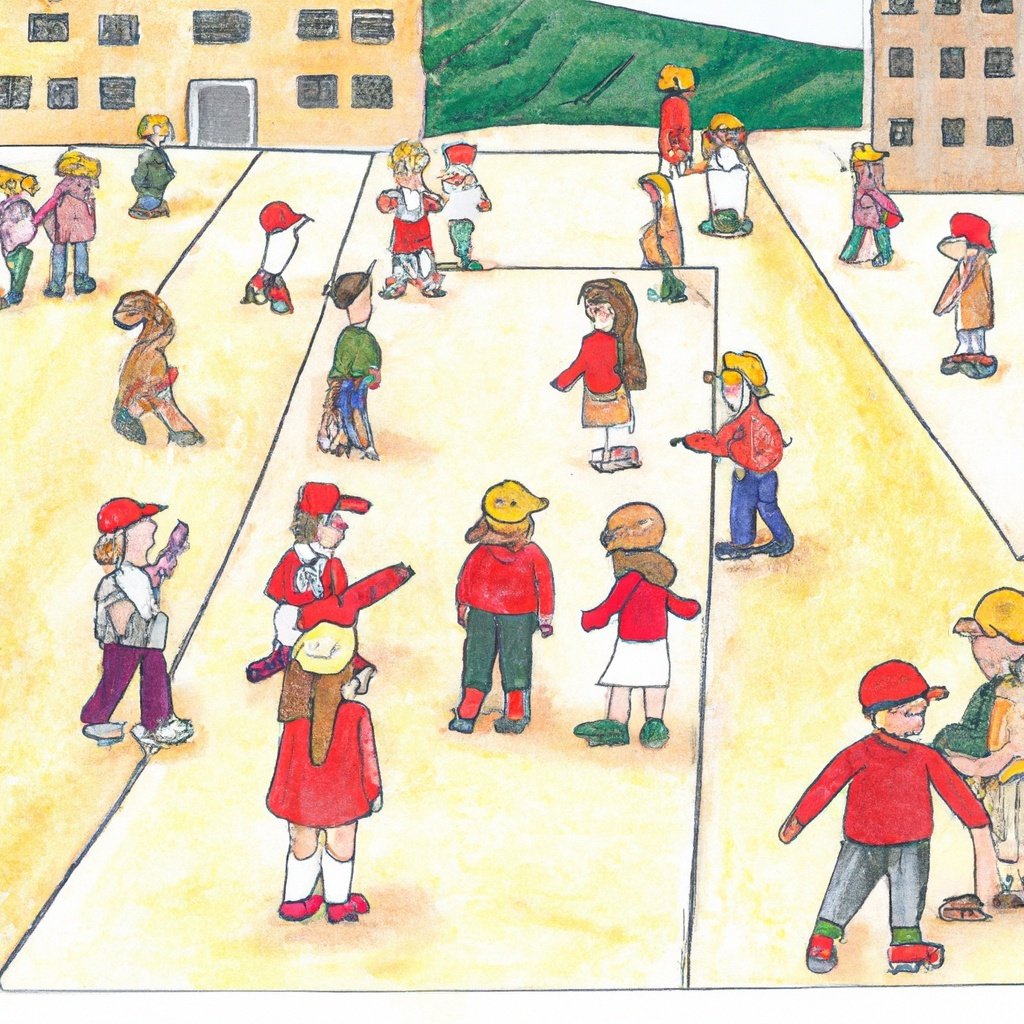

What does it mean to still wet the bed?
If your child starts to find bedwetting a problem, it is important to take action. Your child probably thinks that (s)he is the only one and that all his friends have stopped doing this for a long time. Nothing is less true! We just don't talk about it (unfortunately), so we don't know about each other.
If every child who still wets the bed wears a red cap to school tomorrow, you will be surprised how many red caps you see walking around. Even in your own class you are not the only one with a red cap. Tonight, millions of children aged 5 years and older will wet their beds. To give you an idea over 6.000.000 children in Europe and over 2.500.000 children in the US. So you'r child is certainly not the only one!
There is a chance that your child avoids sleepovers and (school) camps because (s)he is ashamed. Or even feels guilty. This is not necessary at all. Your child really can't do anything about it.
As a parent, it is important not to be disappointed in your child and to always remain positive. How difficult this might be at certain times. But your child doesn't wet the bed for fun. Therefore, focus on the efforts made to get rid of bedwetting (for example the drinking and bathroom pattern during the day) and not on the result.
In addition, it is good to know that there are good solutions against bedwetting.

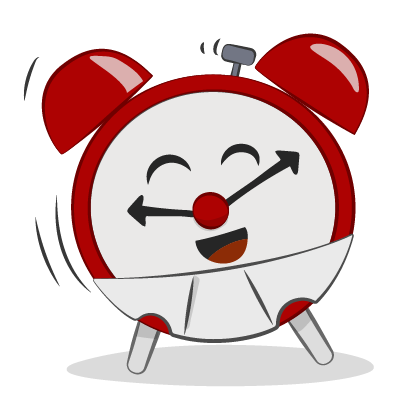

Solutions for bedwetting
On average, children grow out of bedwetting around their 4th birthday. They have learned to wake up on time from a full bladder or they no longer have to urinate at night. This is probably not the case with your child, but fortunately there are several methods to tackle this.
In the beginning, people mainly recommend playful exercises, such as the calendar method. This involves recording daily whether the bed was wet last night. By making it clear, your child becomes more aware of bedwetting and can provide a positive stimulus and bedwetting will stop automatically.
Other parents choose to actively wake the child themselves to make them urinate when they go to bed. This reduces the chance of a wet bed and allows the child to grow out of it naturally.
Then you also have bladder training, for example. This helps make the bladder a bit larger, allowing it to hold more urine and thus reducing the risk of bedwetting.
For children aged 6 and over, the most commonly used solution is the bedwetting alarm training. If your child starts to urinate during sleep, he or she will be immediately woken up by an alarm. By repeating this daily, the brain will make the connection between waking up and having the feeling of a full bladder. Scientific research shows that, with proper guidance, the bedwetting alarm has the greatest chance of success in quickly eliminating bedwetting.
Other solutions include positive stimulation and medication. Click here to delve deeper into all possible solutions against bedwetting.



The number 1 bedwetting alarm training: Urifoon
Urifoon offers the bedwetting alarm since 1954 and we soon discovered that the alarm of the bedwetting alarm alone is not enough to stop your child from wetting the bed. The bedwetting alarm is a training tool and the better it is supervised, the greater the chance of success.
What do you do if your child doesn't wake up from the alarm? You may have had such an experience yourself or heard from others, because many bedwetters are deep sleepers... And what do you do if your child has several wetting moments during the night? Then the training is much too tiring and impossible to maintain...
Just some examples of common situations. Without expert guidance, there is a good chance that the training will be stopped prematurely and without success, because it is all much too tiring and no progress is visible.
This does not happen with the Urifoon bedwetting alarm training. We always offer expert guidance from experts who know exactly how your child will respond to the bedwetting alarm. Our motivating guidance is full of fun exercises. Your child can train with the bedwetting alarm in a playful way, wakes up quickly from the alarm (even the very deep sleepers) and does not urinate unnecessarily often at night.
This makes the training less tiring and progress is visible quickly. This is enormously stimulating, which means that the chance of success with the Urifoon bedwetting alarm training is the highest. In the short term, but also measured over several years.
No more bedwetting. How nice would that be?

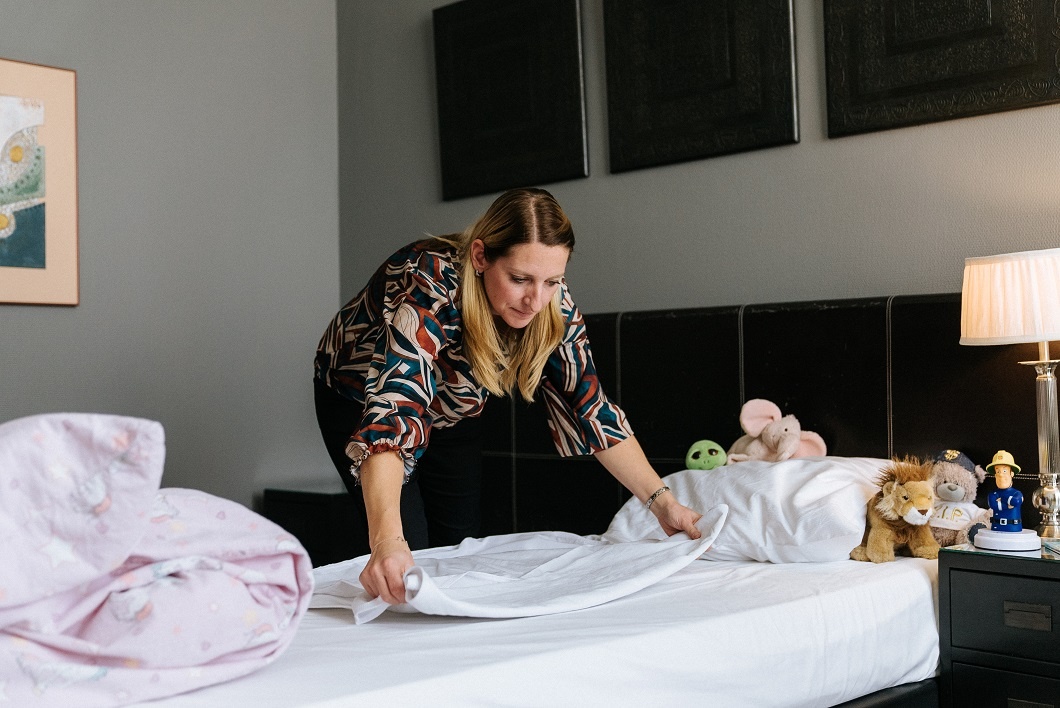

Make it easier for yourself too
With the bedwetting alarm training we can help you to stop your child from wetting the bed. But before your child is potty trained, there are always the inconveniences of wetting accidents.
To get through this period of wet beds as easily as possible, it is wise to think carefully about protecting the bedding. We offer multiple solutions.
A real life hack is to use an absorbent overlay (available in both disposable and washable versions). Place this under your child's hip with several layers on top of each other. Once your child have wetted the bed, you only have to remove the top wet layer and the dry layer is immediately ready. The sooner everyone can go back to sleep.
Would you rather protect the entire mattress? No problem! We sell all kinds of sizes for both 1 and 2-person beds.
What may be less known are our waterproof and breathable duvet covers and pillow covers. This way your child will sleep super comfortably and the duvet and pillow will stay nice and dry in the event of a wetting accident. very hygienic, right? The duvet and pillow also last much longer, which is a bonus.
Finally, we also have the waterproof and breathable sleeping bag liner. This can be used separately, but of course also serves as the ideal protection for the sleeping bag on holiday or during (school) camp.
In short, choosing good protection is a smart choice and prevents a lot of annoyance.



Frequently asked questions
{{ item.title }}

section-reviews-title
Wij scoren een {{ reviews.total.rating }} uit {{ reviews.total.quantity }} beoordelingen op Klanten Vertellen.





